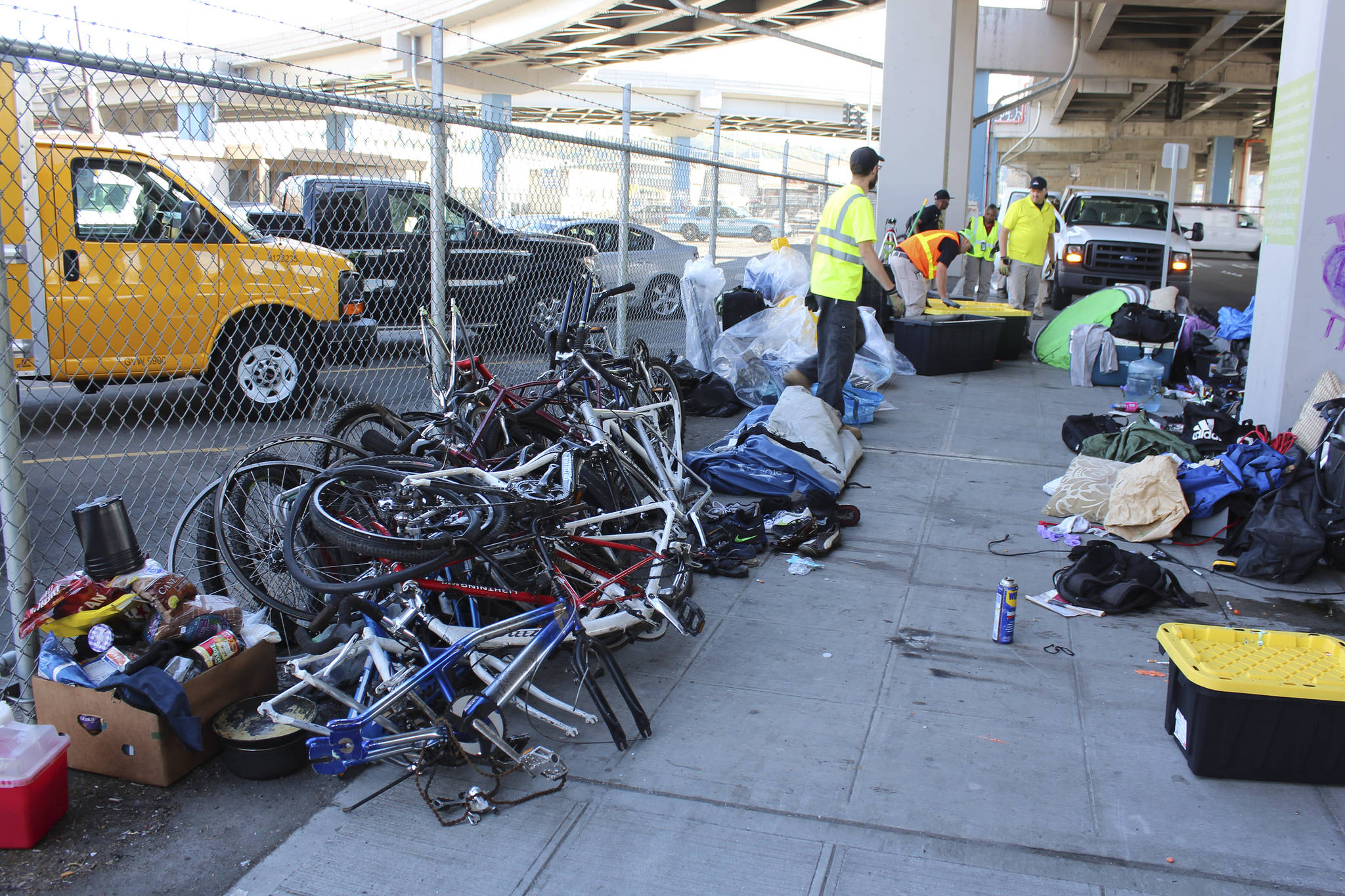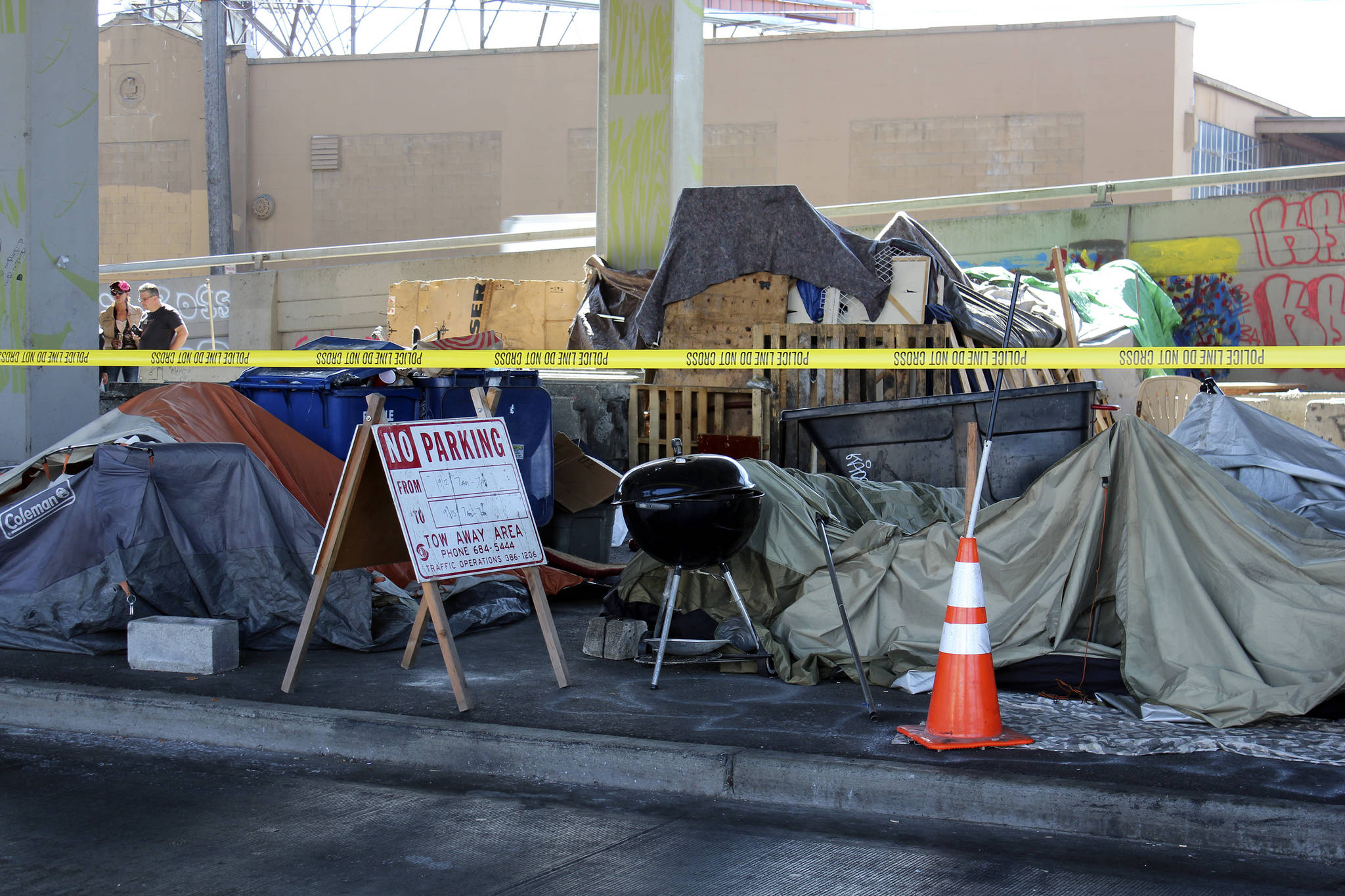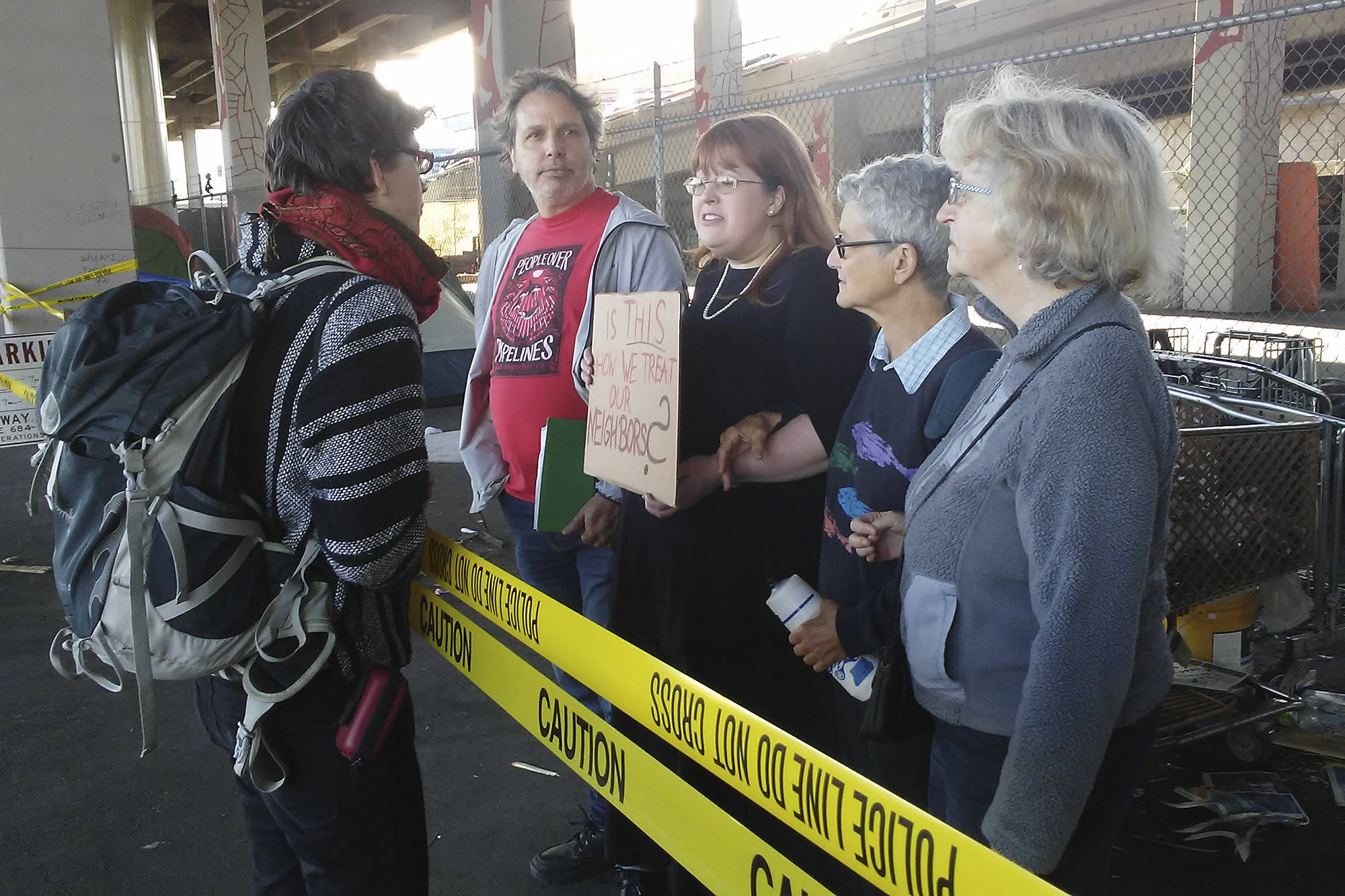First thing Tuesday morning, Seattle began the gradual process of evicting the campers who remain living along Spokane Street in Sodo, under the overpass just east of the West Seattle Bridge. Following weeks of outreach (campers were given notice of the clearing on August 23, according to the city), the city’s Navigation Team—a cohort of police officers and social workers—paired the process of encouraging people to take offers of indoor shelter with the process of clearing out and packing up tents and possessions.
It will take nearly a week, or longer, to move everyone and their possessions out, the city says. By late morning on Tuesday, the stretch of road between Colorado Street and Second Avenue South was ringed by caution tape and the tent homes had been turned into rubble piles that workers were sorting and removing: Bicycles, wooden platforms, blankets, tarps, tents, buckets, and all kinds of other belongings, including a stuffed animal and a small barbecue grill. Navigation Team members put unclaimed possessions in large plastic bins—available, they said, for campers to reclaim from the city if they choose.
“The protocol, they way they’re doing it today, seems a little bit better, just a little bit better,” says Reavy Washington, a former resident of an encampment called the Field and an advocate with the group Stop the Sweeps. “This is actually the first time I’ve ever seen them put stuff in bins” and give campers an opportunity to reclaim their belongings. “Normally, they don’t do that. Normally, they just throw everything in the garbage.”
Washington is one of the plantiffs in a lawsuit brought against the city by the state ACLU, which alleges that Seattle has violated campers’ constitutionally-protected rights against illegal search and seizure. Plaintiffs argue that Seattle campers’ property has been salvaged only 15 percent of the time and only nine evictees have successfully reclaimed seized property since January 2016.
In addition to personal property, though, the major question looms: Where will the evictees go?
Some campers have already accepted offers of alternative shelter from the city; others have not, says Sgt. Eric Zerr, a member of the Navigation Team for the Seattle Police Department. “Right now, we’re running at about a 35 percent referral rate,” he says, meaning a little over a third of people take the offers of temporary shelter they’re given. The others, most likely, according to what Zerr and his team have observed, move to another street in another part of the city. “There are lot of people who are just very apprehensive about authority or moving inside,” he says. Some struggle with mental illness or “anti-social issues; there’s just a lot of things going on.”
There are approximately 300 unauthorized encampments across the city right now, Zerr says, and the Spokane Street encampment, among the largest, is a priority for clearing primarily for the public health and safety hazards it poses. Tuesday’s sweep was a continuation of months of outreach in the entire area, as well as evictions; in April, RV and tent campers were swept from underneath the West Seattle Bridge near here, too, in response to a fire underneath the bridge.
But despite the city’s attempts to offer alternatives, many campers and homeless advocates mistrust the promise. The city now has at least two “low-barrier” shelters, the 75-bed Navigation Center in the International District and the Compass Housing Alliance’s new 100-bed shelter in First Hill, which allow clients to bring pets and partners, to continue to use drugs or alcohol, to come and go freely, and to have 24-7 storage of personal belongings. Zerr says that a number of campers from the stretch of Spokane Street they cleared Tuesday had accepted offers of lodging at these two shelters, as well as others around the city, including Peter’s Place, Union Gospel Mission, and Hammond House.
But there were over 100 people living along Spokane Street before Tuesday’s sweep. Just 175 total beds between the two low-barrier shelters—which are mostly occupied already—doesn’t leave much room, Washington says. “Where are all these people gonna go? You tell them they gotta leave here. Where are they going? They’re gonna end up sooner or later back on City Hall steps.”
Spokane Street’s tent city “wasn’t the prettiest thing,” he adds, “but people called it home.”
The Southeast Seattle Neighborhood Action Council agrees. The activist group sent out a statement late Monday night, alerting the public that they’d be in attendance on Tuesday “to show support to residents, document the sweep, and ensure police comply with their guidelines” as well as to demonstrate “against these harmful, financially unsound, and ineffective policies that provide no long- or often even short-term solutions for the encampment residents.”
A little before 10 a.m. on Tuesday, two NAC members were arrested for criminal trespass, according to several observers and NAC member Travis Thompson, after refusing to leave the area the Navigation Team was clearing.
The point of the action, Thompson says, was to draw attention to the city’s ongoing encampment-clearing process, which they believe is neither helpful nor humane. “We believe that the sweeps are traumatizing and destabilizing. And ‘move along’ to where, right? These folks, a lot of the people we’re talking to, don’t have anywhere else to go. I’ve been in other camps where you talk to most of the people there, and they’ve been at several other camps. They’re just being pushed around the city.” To some extent, Zerr confirms this (though he wouldn’t say “pushed”); he says he and his team have had many conversations with many of the same people in different encampment locations over the months.
“At any given moment, we can see that folks are making their best choice,” Thompson continues. “The folks living out here have a community, they have safety, they have organization. They can come and go at the times that they please, and for them this is the best option. The city is not presenting anything else.” And that, he adds, “gets to the heart of this. The real problem is that we don’t have deeply affordable housing.” Temporary shelter does not solve the problem, he says.
To that end, also on Tuesday, in anticipation of the Spokane Street sweep, City Council candidate Jon Grant, Councilmember Kshama Sawant, and the Seattle Peoples Party announced their plan to build 5,000 homes for the homeless over the next five years. As authorities’ most recent count estimated that there are 5,483 people living on the streets across King County, this “will effectively end unsheltered homelessness in Seattle,” reads a statement the group released Tuesday. “The city’s policy of sweeps only achieves a circular displacement while not addressing the core of our homelessness crisis: a desperate need for more affordable housing.”
The funding would come from an increase in the city’s corporate tax rate (details here). Grant, Sawant, and the Peoples Party also endorse the Housing for All campaign that several hundred activists launched on Saturday. “We view [the 5,000 homes plan] as kind of like a down payment” on the Housing for All proposal, Grant says, which is, in part, a call to quadruple the number of deeply affordable units that the city is building. “For us, what we’d really like to see is bold action on this that is really tangible that can be put into practice,” he adds, “not just slogans.”
Meanwhile, according to Zerr, the Navigation Team is doing the best it can to help build relationships with people living outside, and then, if possible, to bring them inside. “The more times we have contact with them, the more chances we get to make offers, and the better chance they will at some point take up the offer and move into shelter,” Zerr says. “If they don’t want to today, that’s totally fine. Because odds are, at some point, they will.”










